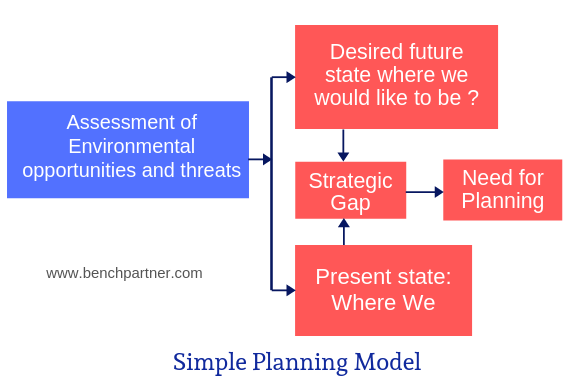What is Planning?
Planning is the primary function of management. It is the outline of the activities to be done in the future predetermined goals. It means looking ahead and chalking out the future course of action.
Meaning and Definition of Planning
Planning is concerned with deciding in advance what, when, where, why and how is to be done and who shall do it. Thus, planning is the process of setting goals and choosing the means to achieve those goals.
It is also defined as the process of choosing among alternatives. It is thinking before doing. It is a preparatory step for the action that is to follow. In fact, planning is the outline of future activities to be done for achieving predetermined goals.
Without plans managers cannot know how to organize people and resources effectively for achieving Simply, planning is the process by which managers define goals and take necessary steps to ensure that these goals are achieved. Goals imply a desired future state.
Planning arises from the recognition that some intervention is needed to bring about a change from the current or present state to some desired or alternate future state.
The difference between the present level and e future state is commonly known as strategic gap. It requires time and preparation to bridge this gap. This process is shown in the following below feagure:

Simple Planning Model Planning is a mental process which covers:
- assessment oft the future
- determination of objectives in the light of future
- development of alternative courses of action to achieve such objectives, and
- selection of the best course of action among these alternatives.
Hence, it is blue-print for action. Without planning other functions become mere activity producing nothing but chaos.
Some of the important definitions of planning are given below:
According to Koontz and O'Donnell, "Planning is deciding in advance what to do, how to do it, when to do it and who is to do it. Planning bridges gap from where we are to where we want to go".
In the words of Mary Cushing Niles, "Planning is the conscious process selecting and developing the best course of action to bridges gap from where we are to where we want to go" accomplish an objective".
ME. Hurley regards that, "Planning is deciding in advance what is to be done. It involves the selection of objectives, policies, procedures and programs from among alternatives".
According to Harold Koontz and Heinz Weihrich, "Planning involves selecting purposes and objectives of the actions to achieve them; it require decision making, that is choosing from among alternative future courses of action".
A careful analysis of above Definitions of Planning reveals that:
- planning is concerned with future and it is looking ahead.
- it involves thinking and analysis of information.
- it involves a predetermined course of action.
- it specifies the objectives to be attained in the future it is basically a problem of choosing from alternative courses of action.
- it involves both decision making and problem solving.
- it is thinking before doing.
- its objectives are to achieve better results.
Importance of Planning
Planning is definitely significant as it directs us where to go, it furnishes direction and decreases the danger of risk by making predictions. The significant advantages of planning are provided below:
Planning provides directions:
Planning assures that the objectives are certainly asserted so that they serve as a model for determining what action should be taken and in which direction. If objects are well established, employees are informed of what the company has to do and what they need do to accomplish those purposes.
Planning decreases the chances of risk:
Planning is an activity which permits a manager to look forward and predict changes. By determining in prior the tasks to be completed, planning notes the way to deal with changes and unpredictable effects.
Planning decreases overlapping and wasteful activities:
Planning works as the foundation of organising the activities and purposes of distinct branches, departments, and people. It assists in avoiding chaos and confusion. Since planning guarantees precision in understanding and action, work is conducted on easily without delays.
Planning encourages innovative ideas:
Since it is the primary function of management, new approaches can take the form of actual plans. It is the most challenging project for the management as it leads all planned actions pointing to growth and of the business.
Planning aids decision making:
It encourages the manager to look into the future and make a decision from amongst several alternative plans of action. The manager has to assess each option and pick the most viable plan.